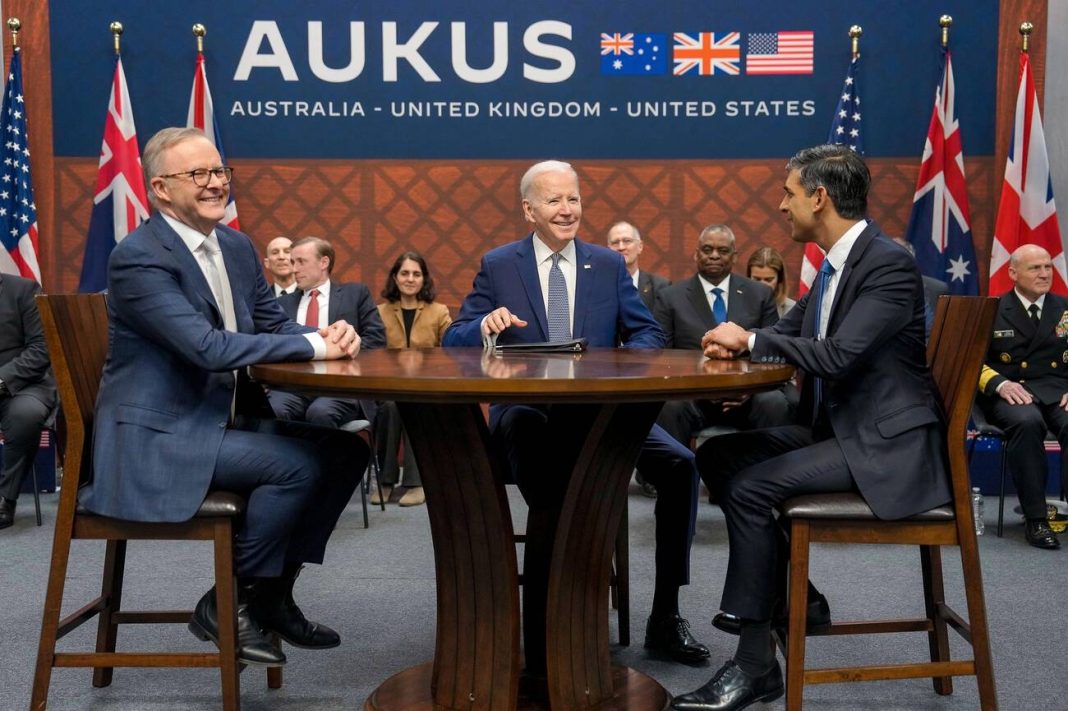In a significant diplomatic address at the Asia House in London, Chinese Ambassador Zheng Zeguang expressed deep concern over the AUKUS Security Pact involving Australia, Britain, and the United States.
The AUKUS security alliance primarily focuses on developing a new generation of nuclear submarines for Australia. It is a strategic response to China’s ascension as a military and economic force in the Indo-Pacific region. Ambassador Zheng Zeguang referred to the potentially destabilising impact of exclusive alliances, such as AUKUS, on regional stability. He emphasised that such blocs are counterproductive, fostering division and friction rather than contributing to harmonious coexistence.
The Chinese ambassador in London has also extended hope for improving mutual trust and cooperation between Britain and China, emphasising the importance of open dialogue. The context of the strained UK-China relationship was acknowledged in the ambassador’s speech. Factors such as security concerns, disputes over the treatment of pro-democracy campaigners in Hong Kong, and human rights issues have contributed to these tensions. Despite these challenges, Zheng conveyed China’s consistent policy of seeking a relationship with the UK based on mutual respect, non-interference in internal affairs, and win-win cooperation.
The AUKUS alliance, one of the recent most significant defence collaborations, has garnered global attention. The pact’s focus on developing nuclear-powered submarines for Australia aims to bolster the country’s defence capabilities in response to perceived threats in the Indo-Pacific. This strategic move, however, has not only strained relations with China but has also resulted in tensions with France, feeling excluded from the alliance and labelling the agreement as a “stab in the back.”
Addressing the broader geopolitical implications of the AUKUS alliance, Ambassador Zheng underscored China’s commitment to thwart any attempt at Taiwan’s independence, emphasising a resolute stance against external interference. This alliance, viewed by many as a response to China’s expansionism, has heightened tensions among the involved nations, with China condemning what it sees as an outdated Cold War mentality.
In response to the ambassador’s warnings, UK officials, including Foreign Secretary Lord Cameron and Indo-Pacific Minister Anne-Marie Trevelyan, expressed optimism regarding continued engagement with China. Trevelyan stressed the importance of maintaining open channels for discussion, including addressing areas of concern such as Hong Kong, the South China Sea, and the Taiwan Strait.
As the AUKUS alliance shapes the geopolitical landscape, it signifies a powerful defence collaboration in the Indo-Pacific, earning support from regional partners such as Japan. The alliance also reaffirms the UK’s post-Brexit commitment as a key military partner for the United States. This geopolitical significance extends to President Biden’s focus on Asia, which is evident in the upcoming Quad summit involving Japan, the US, Australia, and India.
Questions surrounding the AUKUS alliance’s compliance with the Nuclear Non-Proliferation Treaty (NPT) have also emerged. While the International Atomic Energy Agency (IAEA) has announced an investigation, it is important to note that several countries have already used nuclear technology for submarine propulsion, with the IAEA overseeing adherence to non-proliferation norms.
Ambassador Zheng’s warnings shed light on the delicate balance of power in the Indo-Pacific region and the potential repercussions of strategic alliances. The AUKUS pact not only escalates geopolitical tensions but also underscores the intricate dynamics of global alliances in the 21st century.
In conclusion, as the AUKUS alliance shapes the geopolitical landscape, critics emphasise the imperative of responsible global stewardship in defence technologies. Military development, especially within alliances such as AUKUS, should be critically examined, transcending geographical origins. If unchecked, the proliferation of advanced military technologies risks contributing to an arms race and fostering an environment of heightened tensions and potential conflict.
From a global standpoint, calls for transparency and adherence to international agreements such as the Nuclear Non-Proliferation Treaty (NPT) are paramount. This perspective underscores the need for a comprehensive evaluation of military initiatives, urging nations to prioritise dialogue, disarmament, and cooperative security measures. As the world looks at these developments, the impact of such strategic decisions will undoubtedly shape the future geopolitical landscape, prompting reflection on the broader implications of militarisation and the quest for a more secure and cooperative global order.

